A heartwarming yet harrowing story unfolded recently involving a one-year-old feline named Charlie, whose run-in with danger serves as a significant reminder of the perils that come with dark nights. Charlie sustained grave injuries to his face and jaw, suspected to be the result of a road traffic accident. This alarming incident has been brought to the forefront by the PDSA, a leading veterinary charity, as part of an urgent awareness campaign emphasizing the reality that winter nights can pose serious risks to cats. The PDSA is making a case for increased vigilance among pet owners as the clocks change and daylight fades.
Veterinary professionals, like PDSA Vet Nurse Shauna Walsh, were quick to act when Charlie was rushed to their clinic. His injuries included a fractured lower jaw and significant facial trauma, necessitating immediate and comprehensive medical attention. Walsh reflected on the situation, noting, “Had it not been for the PDSA’s intervention, Charlie’s future would have been bleak.” As the story unfolds, it is increasingly clear that both Charlie’s life and the emotional wellbeing of his owner depend on timely and effective veterinary care.
For pet owners like Conway, the emotional toll of such unexpected accidents can be overwhelming. He described feeling “devastated” at the prospect of losing Charlie, a cat who had quickly become an irreplaceable part of their family. Conway characterized Charlie as more than just a pet, referring to him as a companion and a friend to his young daughter Emily. In moments like this, the bond between animals and their human families becomes poignantly clear.
With veterinary bills amounting to nearly £850, Conway faced a challenge. As he mentioned, he was navigating between job contracts, making this financial burden particularly daunting. His reflection on this situation exposes a brutal reality many pet owners face: the intersection between love for a pet and the practicalities of life. Thankfully, thanks to PDSA’s support framework, Charlie received the vital treatment he needed, making a full recovery possible.
As we transition into shorter days and longer nights, the timing of this narrative could not be more fitting. The PDSA emphasizes that autumn and winter seasons raise the stakes for outdoor cats. According to their experts, cats are significantly more likely to become involved in car accidents as visibility decreases. The organization sees approximately 2,400 road traffic accident cases each year, underscoring the pressing need to take preventive measures during this critical time.
Shauna Walsh further elaborates that “it can cost up to £2,000 to treat a cat and about £2,800 for a dog,” each instance overshadowed by the concern of ensuring these beloved pets remain safe from harm in a world fraught with accidents. The narrative of Charlie does not just serve to document one cat’s struggle; it captures a broader call to action for pet owners everywhere to reconsider their outdoor protocols as the seasons shift.
To aid preventive efforts, the PDSA offers several recommendations aimed at reducing the likelihood of similar incidents for pets. Keeping cats indoors at night emerges as a primary suggestion; this simple measure could mean the difference between life and death for outdoor cats. Further pragmatic advice includes scheduling feeding times around dusk, encouraging a routine that leads them home before dark falls.
Additionally, while collars may provide a semblance of security, the PDSA highlights the risks they pose. If collars are used, opting for reflective materials and quick-release designs allows light to reflect proximity while safeguarding the cat’s well-being. In areas of high traffic, cat owners are encouraged to consider secure outdoor enclosures, allowing their pets some fresh air without the associated dangers of roaming the streets.
Financial planning also plays a vital role in responsible pet ownership. Pet insurance can alleviate stress in cases where unforeseen injuries occur. Pet owners should prioritize this coverage to ensure that financial pressures do not deter them from providing necessary medical care. Moreover, microchipping serves as an essential component of pet safety. Starting June 2024, microchipping will become a legal requirement, further emphasizing its significance in ensuring that lost pets can be reunited with their owners.
The PDSA, with over a century of experience, provides vital resources for both medical care and pet insurance, safeguarding the bond between pets and their owners. The story of Charlie represents not only resilience and recovery but also the communal effort to protect our furry friends in an increasingly hazardous world. The responsibility lies with pet owners to remain vigilant, ensuring that the love they have for their companions is reflected in proactive safety measures.


Leave a Reply